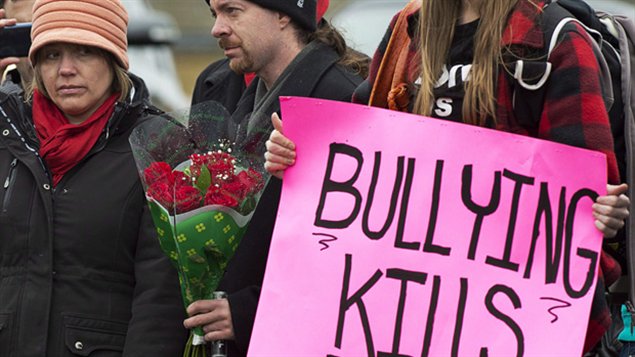Canada’s criminal code must change to prevent tragedies like the suicide of teenager Rehtaeh Parsons, says the leader of her home province of Nova Scotia. Premier Darrel Dexter met with the prime minister to urge him to take strong action to prevent cyberbullying.

Parsons, 17 years old, decided to take her life after police failed to lay charges against four boys she said raped her and then passed around a sexually explicit photo of her. That unleashed a storm of nasty comments made to her in person and over social media.
There will be a review of Canada’s Criminal Code completed by June to combat cyberbullying promised Justice Minister Rob Nicholson. The code already has some provisions which forbid the circulation of child pornography, hate crimes, defamation, and criminal harassment. But there are gaps that could be filled to make it easier to for authorities to investigate and prosecute cases of cyberbullying.

“We don’t have laws particularly focused on the protection of…young people that deal with psychological harassment,” said Nicholas Bala, professor of law at Queen’s University in Ontario. “Some American jurisdictions have these kinds of laws. I think that there’s a recognition in Canada that we need to expand our definitions to keep pace with the new technologies and the greater potential cyberbullying has for causing psychological injury.”
New laws would not solve the problem of cyberbullying on their own said Bala. But it would help focus police, teachers and the public on the problem. “I think we need changes in social attitudes and understanding,” he said. “We need changes in our schools about how these issues are addressed. We certainly need changes in how police are enforcing the law. But there is also a role for law reform.”
While the government of Canada considers reforming the Criminal Code, the province of Nova Scotia has already introduced legislation that would create Canada’s first cyberbullying investigative unit. If passed into law, the legislation would allow victims and their families to get protection orders from a court if they are being harassed online.
The unit could investigate complaints and issue prevention orders to stop someone from communicating online. Offenders could have their computer or phone confiscated and face a fine of $5,000 or six months in jail. Parents could also be liable for damages.

Meanwhile the prime minister’s wife went on television to promote a new website which helps teens who are being bullied and gives guidance on how to remove a photo from the internet.







For reasons beyond our control, and for an undetermined period of time, our comment section is now closed. However, our social networks remain open to your contributions.